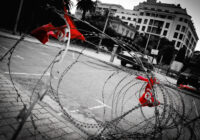In Yemen, the pressure is on both sides to move toward a negotiated settlement.
There are three different views on the Yemen War depending on who’s making the pronouncements. The first sees the US as supporting a naive and destructive effort by Saudi Arabia and the United Arab Emirates to restore the previous Yemeni regime. Second, Yemen matters because of its geostrategic importance. Third, the war is a mistake because it is a regional conflict between Sunnis and Shias that can have no positive outcomes for US interests in the Middle East.
Bruce Riedel, writing in Brookings and elsewhere, has attempted to provide the basic facts about the Shia Houthi rebels and why we are enmeshed in a conflict that goes back at least several generations. In a series of recent articles, he describes their origins and brings us up to date on how a seemingly backwater breakaway movement seeking autonomy in Yemen has become a surrogate of Iran in its sectarian warfare against members of the Gulf Cooperation Council (GCC).
One key indicator of the strategic nature of the conflict was US President Donald Trump’s recent reference to the Iranian role in Yemen, in remarking that the nuclear agreement with Iran placed “no limits at all on its other malign behavior, including its sinister activities in Syria, Yemen, and other places all around the world.”
In Secretary of State Mike Pompeo’s follow-up to the US withdrawal from the deal, he mentioned Iran’s role in Yemen. “In Yemen, Iran’s support for the Houthi militia fuels a conflict that continues to starve the Yemeni people and hold them under the threat of terror,” Pompeo said. “The IRGC [Islamic Revolutionary Guard Corps] has also given Houthi missiles to attack civilian targets in Saudi Arabia and the Emirates and to threaten international shipping in the Red Sea.” As one of the 12 conditions for restarting nuclear talks with Tehran, he noted, “Iran must also end its military support for the Houthi militia and work towards a peaceful political settlement in Yemen.”
Yet Iranian assistance to the Houthis is seldom a news headline. Most often, reporting on the conflict highlights the humanitarian costs, with little effort to provide information on the contenders’ incentives to keep fighting. According to the United Nations, more than 10,000 people have been killed and over 53,000 injured in the conflict. This is in addition to 3 million who have fled their homes, along with countless others who are “living with the threat of mass starvation and disease, including the world’s worst cholera outbreak.”
Negotiated Settlement
With the news that US Special Forces are engaged in the southern border of Saudi Arabia, assisting allied troops to locate and destroy missile sites aimed at targets in the kingdom, it is vital to take a broader look at the conflict, avoiding images that feed retribution rather than reconciliation, and dissecting efforts to bring about a negotiated settlement to the war.
As one commentator noted about Senate hearings on the US presence in Yemen, “Senators certainly should be asking these tough questions, yet their narrow focus resulted in a missed opportunity to ask equally important questions about the opaque U.S. mission to fight terrorism in Yemen, which the Trump administration has conducted with growing intensity.” The same analyst pointed out that the Houthis are but one of the terrorist groups operating in Yemen: “In late 2017, United States Central Command (CENTCOM) assessed that the Islamic State’s Yemen presence had doubled in size over the last year and that it uses the country as a hub to direct attacks against America and its allies.”
Yes, Saudi Arabia is right that Houthi forces in Yemen shouldn’t recruit child soldiers. In addition, though, the Saudi-led coalition shouldn’t bomb and starve Yemeni children. https://t.co/xYtmwWczeo pic.twitter.com/SZIIS5qnw9
— Kenneth Roth (@KenRoth) July 10, 2018
The troubling challenge of accepting a scenario in which the US is a bad actor is the means by which the Houthis spread their mission. Just as with areas under the control of extremists in Iraq and Syria, the Houthis have adopted their tactics to bludgeon local communities into supporting militant positions, down to inculcating young people with an intense hatred for the US and its allies.
Every day, according to sources on the ground and interviews conducted in liberated areas, as well as confiscated schoolbooks, classes for local youths and Houthis begin with a chant called al-sarkha, with the goal of recruiting child soldiers. It goes: “God is great, death to America, death to Israel, damnation to the Jews; Islam is the answer.” It is repeated in schoolbooks, on flags, graffiti, stickers and other media. To Houthi leaders, as with militants of past generations, Zionism and the US are the key culprits manipulating Saudi Arabia and the UAE, who would otherwise be incapable of managing the war.
It is with this vivid scenario in mind that we need to balance the competing claims: The Gulf Arabs are determined to restore the previous Yemeni government, while the other side, led by Houthis trained in Iran, want to set up their own emirate in what is now northern Yemen and southern Saudi Arabia. Since Iran has become the enabler of the Houthi rebellion, the war has become an existential issue for Saudi Arabia in the spiraling conflict between Sunnis and Shias.
The pressure is on both sides to move toward a negotiated settlement, perhaps offering and financing an autonomous Houthi area in northern Yemen. The most recent UN resolution unfortunately calls for disarming the Houthis and heaving occupied areas before talks begin. A new resolution is needed that takes into consideration the physical and psychological obstacles to overcome. Former neighbors, now at war, need strong social, economic and humanitarian support to put the past behind them.
GCC members have already begun the process of pledging aid to rebuild Yemen. Yet the path forward is not simply to disarm and join hands. As Osamah al-Rawhani, program director of the Sanaa Center for Strategic Studies, said, “The international community could show its serious commitment to achieve peace in Yemen by working towards a new UN resolution that pressures all sides to bring this conflict to an end. Yemenis have suffered for so long.”
The longer the situation on the ground is not addressed to effectively stop hostilities, the more likely a generation of young Yemenis and Houthis will grow up to mistrust and label their counterparts as enemies. This has long-term consequences for Yemen, the Middle East, and US stability and security objectives to protect the homeland and America’s allies abroad.
The current situation on the ground and the risks of the prolonged conflict are the subject of my next article for Fair Observer.
The views expressed in this article are the author’s own and do not necessarily reflect Fair Observer’s editorial policy.
Photo Credit: Zhax / Shutterstock.com
Support Fair Observer
We rely on your support for our independence, diversity and quality.
For more than 10 years, Fair Observer has been free, fair and independent. No billionaire owns us, no advertisers control us. We are a reader-supported nonprofit. Unlike many other publications, we keep our content free for readers regardless of where they live or whether they can afford to pay. We have no paywalls and no ads.
In the post-truth era of fake news, echo chambers and filter bubbles, we publish a plurality of perspectives from around the world. Anyone can publish with us, but everyone goes through a rigorous editorial process. So, you get fact-checked, well-reasoned content instead of noise.
We publish 2,500+ voices from 90+ countries. We also conduct education and training programs
on subjects ranging from digital media and journalism to writing and critical thinking. This
doesn’t come cheap. Servers, editors, trainers and web developers cost
money.
Please consider supporting us on a regular basis as a recurring donor or a
sustaining member.
Will you support FO’s journalism?
We rely on your support for our independence, diversity and quality.






